The Crucial m4 SSD Update: Faster with FW0009
by Anand Lal Shimpi on August 31, 2011 12:56 AM ESTAnandTech Storage Bench 2011
Last year we introduced our AnandTech Storage Bench, a suite of benchmarks that took traces of real OS/application usage and played them back in a repeatable manner. I assembled the traces myself out of frustration with the majority of what we have today in terms of SSD benchmarks.
Although the AnandTech Storage Bench tests did a good job of characterizing SSD performance, they weren't stressful enough. All of the tests performed less than 10GB of reads/writes and typically involved only 4GB of writes specifically. That's not even enough exceed the spare area on most SSDs. Most canned SSD benchmarks don't even come close to writing a single gigabyte of data, but that doesn't mean that simply writing 4GB is acceptable.
Originally I kept the benchmarks short enough that they wouldn't be a burden to run (~30 minutes) but long enough that they were representative of what a power user might do with their system.
Not too long ago I tweeted that I had created what I referred to as the Mother of All SSD Benchmarks (MOASB). Rather than only writing 4GB of data to the drive, this benchmark writes 106.32GB. It's the load you'd put on a drive after nearly two weeks of constant usage. And it takes a *long* time to run.
1) The MOASB, officially called AnandTech Storage Bench 2011 - Heavy Workload, mainly focuses on the times when your I/O activity is the highest. There is a lot of downloading and application installing that happens during the course of this test. My thinking was that it's during application installs, file copies, downloading and multitasking with all of this that you can really notice performance differences between drives.
2) I tried to cover as many bases as possible with the software I incorporated into this test. There's a lot of photo editing in Photoshop, HTML editing in Dreamweaver, web browsing, game playing/level loading (Starcraft II & WoW are both a part of the test) as well as general use stuff (application installing, virus scanning). I included a large amount of email downloading, document creation and editing as well. To top it all off I even use Visual Studio 2008 to build Chromium during the test.
The test has 2,168,893 read operations and 1,783,447 write operations. The IO breakdown is as follows:
| AnandTech Storage Bench 2011 - Heavy Workload IO Breakdown | ||||
| IO Size | % of Total | |||
| 4KB | 28% | |||
| 16KB | 10% | |||
| 32KB | 10% | |||
| 64KB | 4% | |||
Only 42% of all operations are sequential, the rest range from pseudo to fully random (with most falling in the pseudo-random category). Average queue depth is 4.625 IOs, with 59% of operations taking place in an IO queue of 1.
Many of you have asked for a better way to really characterize performance. Simply looking at IOPS doesn't really say much. As a result I'm going to be presenting Storage Bench 2011 data in a slightly different way. We'll have performance represented as Average MB/s, with higher numbers being better. At the same time I'll be reporting how long the SSD was busy while running this test. These disk busy graphs will show you exactly how much time was shaved off by using a faster drive vs. a slower one during the course of this test. Finally, I will also break out performance into reads, writes and combined. The reason I do this is to help balance out the fact that this test is unusually write intensive, which can often hide the benefits of a drive with good read performance.
There's also a new light workload for 2011. This is a far more reasonable, typical every day use case benchmark. Lots of web browsing, photo editing (but with a greater focus on photo consumption), video playback as well as some application installs and gaming. This test isn't nearly as write intensive as the MOASB but it's still multiple times more write intensive than what we were running last year.
As always I don't believe that these two benchmarks alone are enough to characterize the performance of a drive, but hopefully along with the rest of our tests they will help provide a better idea.
The testbed for Storage Bench 2011 has changed as well. We're now using a Sandy Bridge platform with full 6Gbps support for these tests.
AnandTech Storage Bench 2011 - Heavy Workload
We'll start out by looking at average data rate throughout our new heavy workload test:
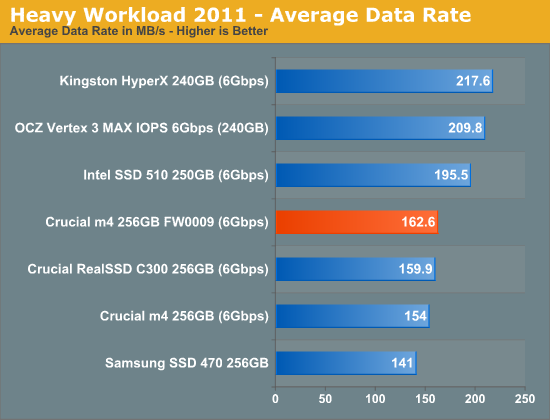
Overall performance in our heavy workload is now on par with last year's C300. We don't see huge gains in our heavy suite but Crucial has never really done well here to begin with. At least the numbers are up above the C300. The SF-2281 based Kingston HyperX has a 33% performance advantage here but if you look at the disk busy time below that amounts to around 4 minutes saved over hours of execution. In other words, you'd be hard pressed to tell the difference between nearly any of these drives.
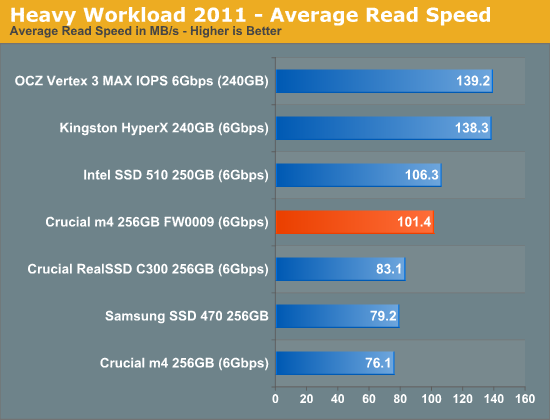
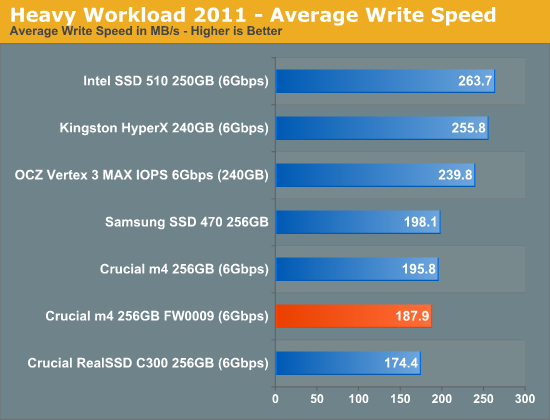
The next three charts just represent the same data, but in a different manner. Instead of looking at average data rate, we're looking at how long the disk was busy for during this entire test. Note that disk busy time excludes any and all idles, this is just how long the SSD was busy doing something:
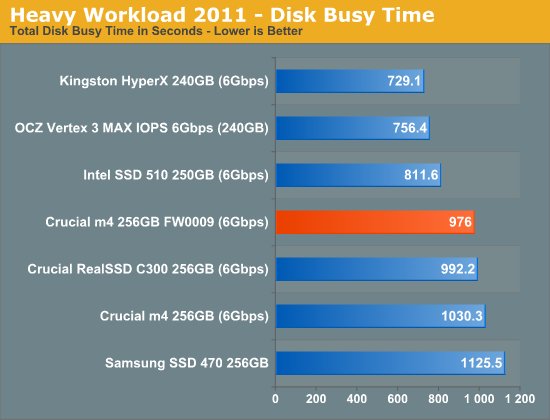
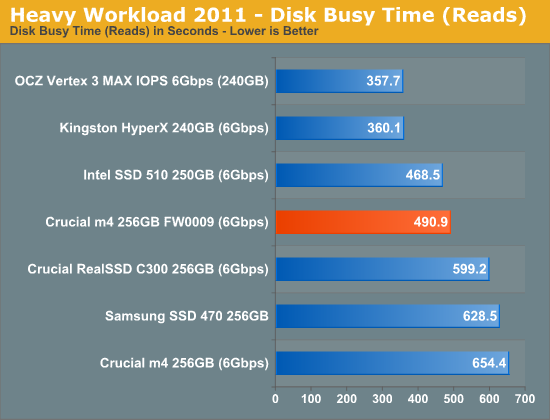
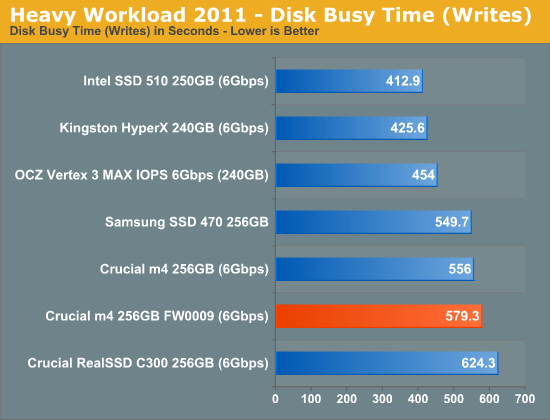










45 Comments
View All Comments
ckryan - Wednesday, August 31, 2011 - link
As one of those Intel 510 owners, I wish Intel would release some differing firmware releases to enhance some aspects of drive performance (I for one would enjoy smaller read and write ability over top end speed the 510 has). It's good to see some improved performance with the M4 at any rate, and there weren't many fixes needed either. Between the Crucial C300 and m4, the Intel 510, and the Corsair P3, you can get some vastly different performance characteristics just on firmware alone.I don't regret buying the 510, but I do regret not saving some money and getting the Performance 3, a drive which recently was going for >$100 less than the 120 GB 510 on Newegg a few days ago. So all told, Micron powered drives are -mostly- the same, but there are some important differences -- mostly price. If you don't want a SandForce controlled SSD, get which ever one is cheaper.
cactusdog - Wednesday, August 31, 2011 - link
The 256GB M4 is excellent value....imaheadcase - Wednesday, August 31, 2011 - link
Picked one up from newegg.com for $330. Its a awesome drive.jdietz - Wednesday, August 31, 2011 - link
I got this same deal. $1.30 per GB is excellent. As mentioned in the conclusion, there's probably little difference between this and more expensive drives.radium69 - Wednesday, August 31, 2011 - link
What counts most for me, is that the M4 seem very reliable. And all of the bad things really are solved. I'm very tempted to buy the 256GB one. Also for what you get, it's absolutely great.With the price they are currently offering it's a very competitive product, and we all know that competition is good. :)
Also Crucial seems to have a great customer service, which is a mood point but still nice to know.
With all of the trouble about sandforce drives, Corsair force 3, OCZ vertex 2 and vertex 3, I absolutely don't want to risk any data corruption/loss. Why spend more and have a greater risk? Why all the bleeding edge products, when you can get nearly same results for a much friendlier price.
GoodRevrnd - Wednesday, August 31, 2011 - link
Yup. If the Samsung 830 turns out to be a disappointment I'll likely be picking up one of these.damianrobertjones - Wednesday, August 31, 2011 - link
"Improvement for intermittent failures in cold boot up related to some specific host systems."Intermittent? According to the forum AND my Elitebook it's EVERY single boot from off that causes the black screen of nothing'nuss.
I just love how they worded that little bit there.
Glad they've fixed the problem... or have they... 'Improvement'?
Patrick Wolf - Wednesday, August 31, 2011 - link
Recently the 128GB M4 has been $180 or less on many sites, making it the best value.Marlin1975 - Wednesday, August 31, 2011 - link
Most were $160 and buy.com was $150 with coupon for the 128gbI could not pass up a non-sandforce 128gb for $150 shipped.
raducanon - Wednesday, August 31, 2011 - link
Today 8/31/2011 at Newegg Shell Shocker Deal (between 10.00 AM - 12.59 PM PT ) the Crucial M4 SSD 128 GB will be $169.99 !!!!!!